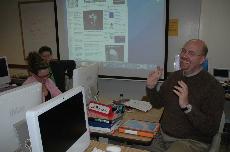Sabbatical helpful for faculty, stressful for their students

November 13, 2008
Faculty members at Simpson College and elsewhere go on sabbaticals to study in their various fields as a way to improve the way they teach and to develop their skills.
While sabbatical can be beneficial to a professor’s teaching career, a sometimes unfortunate drawback to the situation is their inability to interact with their advisees.
“Sabbatical is a period of time off from the classroom granted to various faculty,” Brian Steffen, professor and chair of communication studies, said. “Faculty are eligible every seven years for one semester. It gives you the opportunity to work on a project and allows you to be in your discipline.”
Steffen, who will be going on sabbatical in the spring, said he began to inform his advisees as soon as he learned his proposal for sabbatical had been accepted.
“I was told that I would be awarded a sabbatical in the spring of 2009,” Steffen said. “I’m informing [my advisees] through advising now. My students have known for several months about this.”
For junior Elsabeth Roush, having her adviser on sabbatical has been difficult. Her adviser, David Wolf, associate professor of English, is currently on sabbatical.
“I found out once I got back from Spain,” Roush said. “When I came back to visit my friends, I stopped by his office and he told me.”
Combined with studying abroad the previous semester, Roush said that not having Wolf available has been upsetting.
“He’s kind of like my safe haven,” Roush said. “I’ve been taking some pretty tough classes, but I’ve e-mailed him a few times this past semester.”
Although she misses her adviser’s presence on campus, Roush said that sabbatical is a great opportunity for faculty.
“I think it’s necessary, because every once in a while you need different outlooks and a new way to see your teaching strategy,” Roush said.
Junior Jordan Angell, whose adviser went abroad last year, said the absence was difficult for him as well.
“It really keeps you out of touch with your adviser,” Angell said. “You’re used to your adviser, and when you switch, the new one has no idea what you’re doing.”
Steffen said that he provided three options to his advisees for when he goes on sabbatical in the spring. One option is to get a new adviser.
“Another is to ask somebody to do it on a part-time basis,” Steffen said. “A third option is they can remain with me, and they can e-mail me their classes for next semester, and I’ll put them in the system.”
While on sabbatical next semester, Steffen will be developing skills to teach students about the new mediums of journalism.
“My sabbatical is giving me the opportunity to develop multimedia journalism,” Steffen said. “I’m going to be working with the Indianola newspaper to help them develop their Web site. It’ll be a good experience for me.”
Steffen said that it is important to make sure all the students at Simpson are taken care off when their advisers are unavailable due to sabbatical.
“The important thing is that we take steps to know they’re covered and not have them suffer,” Steffen said. “This is student-centered. We take them into consideration, and there is the positive aspect that you can be refreshed in your discipline.”












